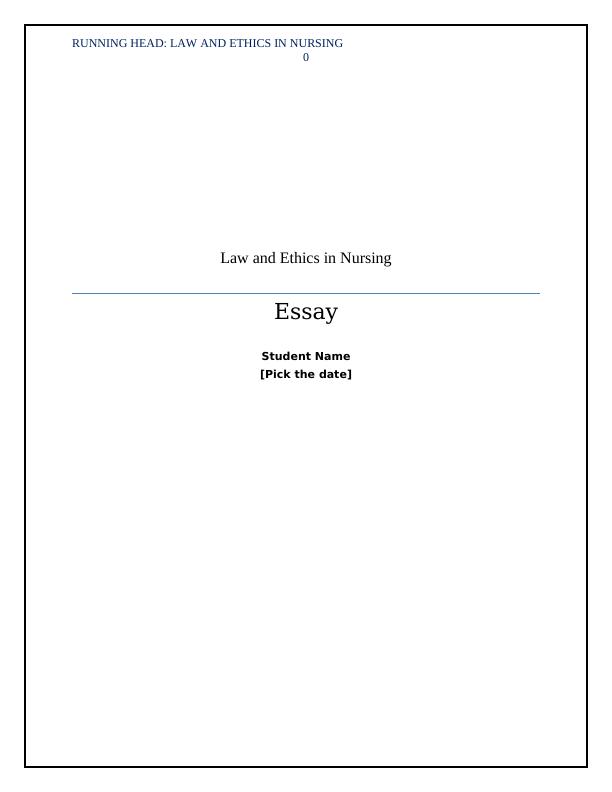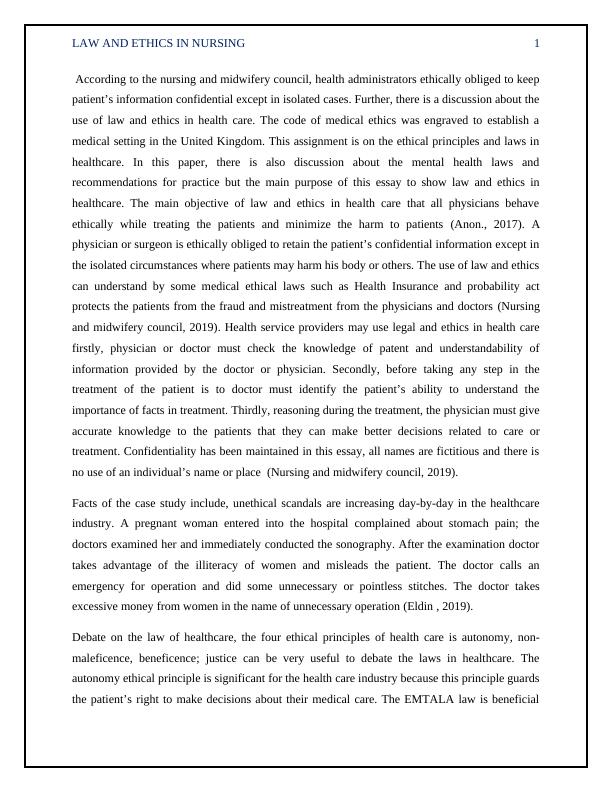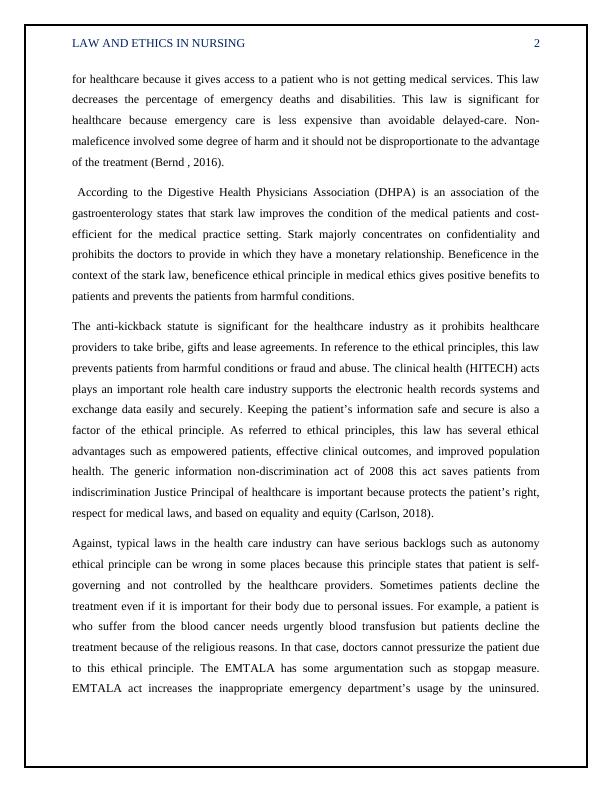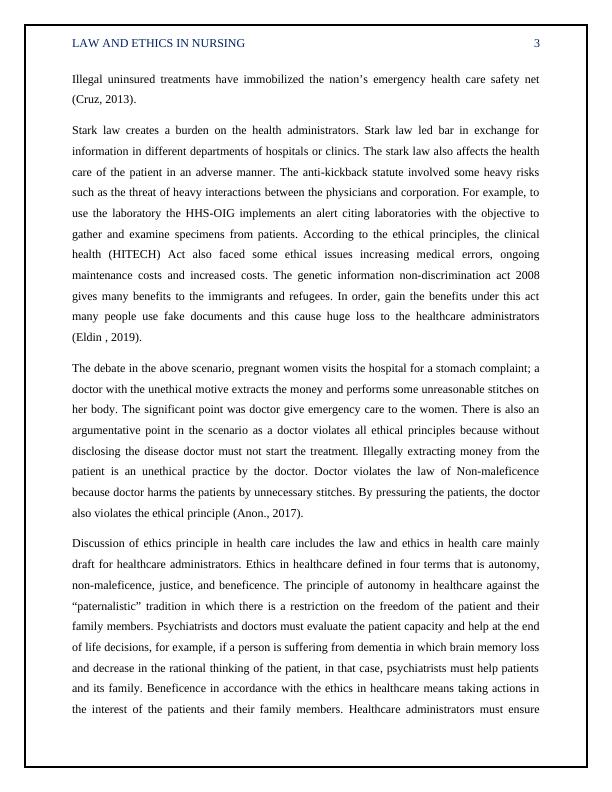Law and Ethics in Nursing
Added on 2022-11-25
12 Pages4055 Words241 Views
RUNNING HEAD: LAW AND ETHICS IN NURSING
0
Law and Ethics in Nursing
Essay
Student Name
[Pick the date]
0
Law and Ethics in Nursing
Essay
Student Name
[Pick the date]

LAW AND ETHICS IN NURSING 1
According to the nursing and midwifery council, health administrators ethically obliged to keep
patient’s information confidential except in isolated cases. Further, there is a discussion about the
use of law and ethics in health care. The code of medical ethics was engraved to establish a
medical setting in the United Kingdom. This assignment is on the ethical principles and laws in
healthcare. In this paper, there is also discussion about the mental health laws and
recommendations for practice but the main purpose of this essay to show law and ethics in
healthcare. The main objective of law and ethics in health care that all physicians behave
ethically while treating the patients and minimize the harm to patients (Anon., 2017). A
physician or surgeon is ethically obliged to retain the patient’s confidential information except in
the isolated circumstances where patients may harm his body or others. The use of law and ethics
can understand by some medical ethical laws such as Health Insurance and probability act
protects the patients from the fraud and mistreatment from the physicians and doctors (Nursing
and midwifery council, 2019). Health service providers may use legal and ethics in health care
firstly, physician or doctor must check the knowledge of patent and understandability of
information provided by the doctor or physician. Secondly, before taking any step in the
treatment of the patient is to doctor must identify the patient’s ability to understand the
importance of facts in treatment. Thirdly, reasoning during the treatment, the physician must give
accurate knowledge to the patients that they can make better decisions related to care or
treatment. Confidentiality has been maintained in this essay, all names are fictitious and there is
no use of an individual’s name or place (Nursing and midwifery council, 2019).
Facts of the case study include, unethical scandals are increasing day-by-day in the healthcare
industry. A pregnant woman entered into the hospital complained about stomach pain; the
doctors examined her and immediately conducted the sonography. After the examination doctor
takes advantage of the illiteracy of women and misleads the patient. The doctor calls an
emergency for operation and did some unnecessary or pointless stitches. The doctor takes
excessive money from women in the name of unnecessary operation (Eldin , 2019).
Debate on the law of healthcare, the four ethical principles of health care is autonomy, non-
maleficence, beneficence; justice can be very useful to debate the laws in healthcare. The
autonomy ethical principle is significant for the health care industry because this principle guards
the patient’s right to make decisions about their medical care. The EMTALA law is beneficial
According to the nursing and midwifery council, health administrators ethically obliged to keep
patient’s information confidential except in isolated cases. Further, there is a discussion about the
use of law and ethics in health care. The code of medical ethics was engraved to establish a
medical setting in the United Kingdom. This assignment is on the ethical principles and laws in
healthcare. In this paper, there is also discussion about the mental health laws and
recommendations for practice but the main purpose of this essay to show law and ethics in
healthcare. The main objective of law and ethics in health care that all physicians behave
ethically while treating the patients and minimize the harm to patients (Anon., 2017). A
physician or surgeon is ethically obliged to retain the patient’s confidential information except in
the isolated circumstances where patients may harm his body or others. The use of law and ethics
can understand by some medical ethical laws such as Health Insurance and probability act
protects the patients from the fraud and mistreatment from the physicians and doctors (Nursing
and midwifery council, 2019). Health service providers may use legal and ethics in health care
firstly, physician or doctor must check the knowledge of patent and understandability of
information provided by the doctor or physician. Secondly, before taking any step in the
treatment of the patient is to doctor must identify the patient’s ability to understand the
importance of facts in treatment. Thirdly, reasoning during the treatment, the physician must give
accurate knowledge to the patients that they can make better decisions related to care or
treatment. Confidentiality has been maintained in this essay, all names are fictitious and there is
no use of an individual’s name or place (Nursing and midwifery council, 2019).
Facts of the case study include, unethical scandals are increasing day-by-day in the healthcare
industry. A pregnant woman entered into the hospital complained about stomach pain; the
doctors examined her and immediately conducted the sonography. After the examination doctor
takes advantage of the illiteracy of women and misleads the patient. The doctor calls an
emergency for operation and did some unnecessary or pointless stitches. The doctor takes
excessive money from women in the name of unnecessary operation (Eldin , 2019).
Debate on the law of healthcare, the four ethical principles of health care is autonomy, non-
maleficence, beneficence; justice can be very useful to debate the laws in healthcare. The
autonomy ethical principle is significant for the health care industry because this principle guards
the patient’s right to make decisions about their medical care. The EMTALA law is beneficial

LAW AND ETHICS IN NURSING 2
for healthcare because it gives access to a patient who is not getting medical services. This law
decreases the percentage of emergency deaths and disabilities. This law is significant for
healthcare because emergency care is less expensive than avoidable delayed-care. Non-
maleficence involved some degree of harm and it should not be disproportionate to the advantage
of the treatment (Bernd , 2016).
According to the Digestive Health Physicians Association (DHPA) is an association of the
gastroenterology states that stark law improves the condition of the medical patients and cost-
efficient for the medical practice setting. Stark majorly concentrates on confidentiality and
prohibits the doctors to provide in which they have a monetary relationship. Beneficence in the
context of the stark law, beneficence ethical principle in medical ethics gives positive benefits to
patients and prevents the patients from harmful conditions.
The anti-kickback statute is significant for the healthcare industry as it prohibits healthcare
providers to take bribe, gifts and lease agreements. In reference to the ethical principles, this law
prevents patients from harmful conditions or fraud and abuse. The clinical health (HITECH) acts
plays an important role health care industry supports the electronic health records systems and
exchange data easily and securely. Keeping the patient’s information safe and secure is also a
factor of the ethical principle. As referred to ethical principles, this law has several ethical
advantages such as empowered patients, effective clinical outcomes, and improved population
health. The generic information non-discrimination act of 2008 this act saves patients from
indiscrimination Justice Principal of healthcare is important because protects the patient’s right,
respect for medical laws, and based on equality and equity (Carlson, 2018).
Against, typical laws in the health care industry can have serious backlogs such as autonomy
ethical principle can be wrong in some places because this principle states that patient is self-
governing and not controlled by the healthcare providers. Sometimes patients decline the
treatment even if it is important for their body due to personal issues. For example, a patient is
who suffer from the blood cancer needs urgently blood transfusion but patients decline the
treatment because of the religious reasons. In that case, doctors cannot pressurize the patient due
to this ethical principle. The EMTALA has some argumentation such as stopgap measure.
EMTALA act increases the inappropriate emergency department’s usage by the uninsured.
for healthcare because it gives access to a patient who is not getting medical services. This law
decreases the percentage of emergency deaths and disabilities. This law is significant for
healthcare because emergency care is less expensive than avoidable delayed-care. Non-
maleficence involved some degree of harm and it should not be disproportionate to the advantage
of the treatment (Bernd , 2016).
According to the Digestive Health Physicians Association (DHPA) is an association of the
gastroenterology states that stark law improves the condition of the medical patients and cost-
efficient for the medical practice setting. Stark majorly concentrates on confidentiality and
prohibits the doctors to provide in which they have a monetary relationship. Beneficence in the
context of the stark law, beneficence ethical principle in medical ethics gives positive benefits to
patients and prevents the patients from harmful conditions.
The anti-kickback statute is significant for the healthcare industry as it prohibits healthcare
providers to take bribe, gifts and lease agreements. In reference to the ethical principles, this law
prevents patients from harmful conditions or fraud and abuse. The clinical health (HITECH) acts
plays an important role health care industry supports the electronic health records systems and
exchange data easily and securely. Keeping the patient’s information safe and secure is also a
factor of the ethical principle. As referred to ethical principles, this law has several ethical
advantages such as empowered patients, effective clinical outcomes, and improved population
health. The generic information non-discrimination act of 2008 this act saves patients from
indiscrimination Justice Principal of healthcare is important because protects the patient’s right,
respect for medical laws, and based on equality and equity (Carlson, 2018).
Against, typical laws in the health care industry can have serious backlogs such as autonomy
ethical principle can be wrong in some places because this principle states that patient is self-
governing and not controlled by the healthcare providers. Sometimes patients decline the
treatment even if it is important for their body due to personal issues. For example, a patient is
who suffer from the blood cancer needs urgently blood transfusion but patients decline the
treatment because of the religious reasons. In that case, doctors cannot pressurize the patient due
to this ethical principle. The EMTALA has some argumentation such as stopgap measure.
EMTALA act increases the inappropriate emergency department’s usage by the uninsured.

LAW AND ETHICS IN NURSING 3
Illegal uninsured treatments have immobilized the nation’s emergency health care safety net
(Cruz, 2013).
Stark law creates a burden on the health administrators. Stark law led bar in exchange for
information in different departments of hospitals or clinics. The stark law also affects the health
care of the patient in an adverse manner. The anti-kickback statute involved some heavy risks
such as the threat of heavy interactions between the physicians and corporation. For example, to
use the laboratory the HHS-OIG implements an alert citing laboratories with the objective to
gather and examine specimens from patients. According to the ethical principles, the clinical
health (HITECH) Act also faced some ethical issues increasing medical errors, ongoing
maintenance costs and increased costs. The genetic information non-discrimination act 2008
gives many benefits to the immigrants and refugees. In order, gain the benefits under this act
many people use fake documents and this cause huge loss to the healthcare administrators
(Eldin , 2019).
The debate in the above scenario, pregnant women visits the hospital for a stomach complaint; a
doctor with the unethical motive extracts the money and performs some unreasonable stitches on
her body. The significant point was doctor give emergency care to the women. There is also an
argumentative point in the scenario as a doctor violates all ethical principles because without
disclosing the disease doctor must not start the treatment. Illegally extracting money from the
patient is an unethical practice by the doctor. Doctor violates the law of Non-maleficence
because doctor harms the patients by unnecessary stitches. By pressuring the patients, the doctor
also violates the ethical principle (Anon., 2017).
Discussion of ethics principle in health care includes the law and ethics in health care mainly
draft for healthcare administrators. Ethics in healthcare defined in four terms that is autonomy,
non-maleficence, justice, and beneficence. The principle of autonomy in healthcare against the
“paternalistic” tradition in which there is a restriction on the freedom of the patient and their
family members. Psychiatrists and doctors must evaluate the patient capacity and help at the end
of life decisions, for example, if a person is suffering from dementia in which brain memory loss
and decrease in the rational thinking of the patient, in that case, psychiatrists must help patients
and its family. Beneficence in accordance with the ethics in healthcare means taking actions in
the interest of the patients and their family members. Healthcare administrators must ensure
Illegal uninsured treatments have immobilized the nation’s emergency health care safety net
(Cruz, 2013).
Stark law creates a burden on the health administrators. Stark law led bar in exchange for
information in different departments of hospitals or clinics. The stark law also affects the health
care of the patient in an adverse manner. The anti-kickback statute involved some heavy risks
such as the threat of heavy interactions between the physicians and corporation. For example, to
use the laboratory the HHS-OIG implements an alert citing laboratories with the objective to
gather and examine specimens from patients. According to the ethical principles, the clinical
health (HITECH) Act also faced some ethical issues increasing medical errors, ongoing
maintenance costs and increased costs. The genetic information non-discrimination act 2008
gives many benefits to the immigrants and refugees. In order, gain the benefits under this act
many people use fake documents and this cause huge loss to the healthcare administrators
(Eldin , 2019).
The debate in the above scenario, pregnant women visits the hospital for a stomach complaint; a
doctor with the unethical motive extracts the money and performs some unreasonable stitches on
her body. The significant point was doctor give emergency care to the women. There is also an
argumentative point in the scenario as a doctor violates all ethical principles because without
disclosing the disease doctor must not start the treatment. Illegally extracting money from the
patient is an unethical practice by the doctor. Doctor violates the law of Non-maleficence
because doctor harms the patients by unnecessary stitches. By pressuring the patients, the doctor
also violates the ethical principle (Anon., 2017).
Discussion of ethics principle in health care includes the law and ethics in health care mainly
draft for healthcare administrators. Ethics in healthcare defined in four terms that is autonomy,
non-maleficence, justice, and beneficence. The principle of autonomy in healthcare against the
“paternalistic” tradition in which there is a restriction on the freedom of the patient and their
family members. Psychiatrists and doctors must evaluate the patient capacity and help at the end
of life decisions, for example, if a person is suffering from dementia in which brain memory loss
and decrease in the rational thinking of the patient, in that case, psychiatrists must help patients
and its family. Beneficence in accordance with the ethics in healthcare means taking actions in
the interest of the patients and their family members. Healthcare administrators must ensure

End of preview
Want to access all the pages? Upload your documents or become a member.
Related Documents
Ethics, Law and Healthcare | Reportlg...
|8
|1929
|21
NURSING ETHICS.lg...
|7
|1791
|2
Ethical Decision Making in Nursing Practicelg...
|12
|3914
|2
Assignmen on Health Care Ethics (doc)lg...
|5
|960
|25
Importance of an Ethical Approach to Health Care Practicelg...
|6
|1317
|461
Project Management in Practice: Assignmentlg...
|10
|2887
|32
